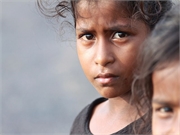- Could Your Grocery Store Meat Be Causing Recurring UTIs?
- Are You Making This Expensive Thermostat Error This Winter?
- Recognizing the Signs of Hypothyroidism
- 10 Strategies to Overcome Insomnia
- Could Artificial Sweeteners Be Aging the Brain Faster?
- Techniques for Soothing Your Nervous System
- Does the Water in Your House Smell Funny? Here’s Why
- Can a Daily Dose of Apple Cider Vinegar Actually Aid Weight Loss?
- 6 Health Beverages That Can Actually Spike Your Blood Sugar
- Treatment Options for Social Anxiety Disorder
Vaccine Might Guard Against Bacteria That Cause Diarrhea in Kids

An experimental vaccine helps protect monkeys against bacteria that cause diarrhea in millions of children worldwide, researchers report.
Bacterial gastroenteritis — a digestive problem associated with malnutrition among millions of children younger than age 5 each year in developing nations — can be caused by Campylobacter bacteria. Repeated infections can stunt growth and impair brain development.
Developing an effective Campylobacter vaccine could help improve the health of people who are regularly exposed to the bacteria due to poor sanitation, according to the researchers.
The experimental vaccine uses bacteria that have been inactivated by a hydrogen peroxide-based approach called HydroVax technology.
For the study, the researchers tested it on several strains of Campylobacter in rhesus monkeys and found that it was 83% effective in preventing Campylobacter-associated diarrhea, according to the report published June 24 in the journal Science Advances.
“We’re hoping to move forward into clinical trials because this is a huge problem around the world,” said study co-senior author Mark Slifka, a professor at Oregon Health & Science University (OHSU), in Portland.
“Campylobacter has been associated with infant growth stunting. Targeting a disease like this can help a lot of people — including kids in developing countries — grow stronger by reducing the damage caused by these bacteria,” Slifka said in a university news release.
There were no harmful side effects in the monkeys or in mice that received the vaccine, the study authors noted.
“We are happy with the safety of the vaccine so far, but in the end the vaccine will need to be studied in humans in the form of Phase 1 clinical trials in order to directly answer this important question,” Slifka said.
Study co-senior author Ian Amanna added that the problem is not limited to developing countries.
“Along with the exciting opportunity to help children in developing countries, many people don’t realize how much of a problem Campylobacter is here in the U.S.,” said Amanna, vice president for research at Najit Technologies, an OHSU spinoff.
“Studies have shown that these bacteria are responsible for up to $5.6 billion in economic costs annually in America,” Amanna said.
More information
The U.S. Centers for Disease Control and Prevention has more on Campylobacter.
Source: HealthDay
Copyright © 2026 HealthDay. All rights reserved.










